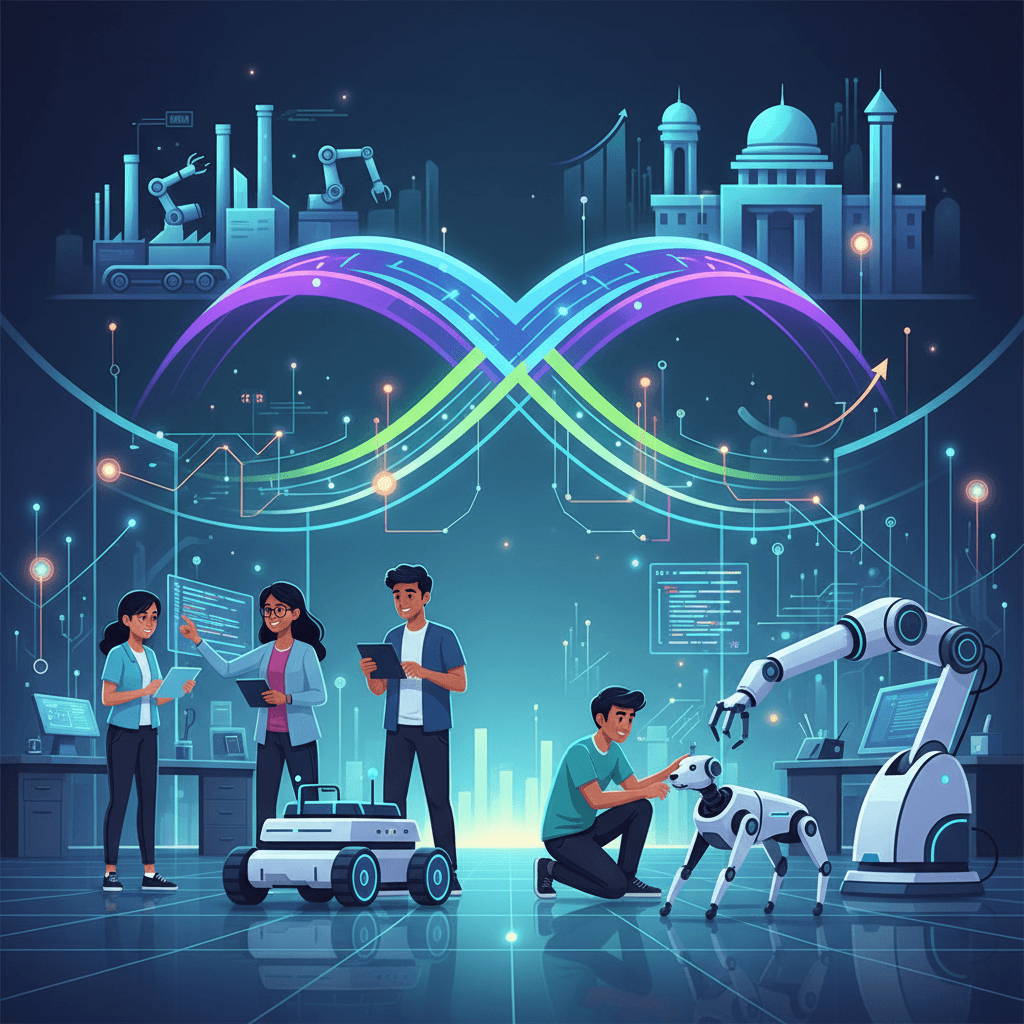Addverb, IITs Partner to Transform India into Global Robotics Powerhouse
Strategic university partnerships cultivate a skilled robotics workforce, fueling the 'Make in India' mission and global automation leadership.
November 11, 2025

In a significant move to fortify India's position in the global robotics and automation landscape, industry leader Addverb has launched a major collaborative initiative with several of the nation's premier academic institutions, including the prestigious Indian Institutes of Technology (IITs), NIIT University, and the New Age Makers' Institute of Technology (NAMTECH).[1][2][3] This strategic partnership aims to dismantle the long-standing barriers between industry and academia, fostering a robust ecosystem for robotics education, research, and innovation. By embedding industry-relevant skills and practical experience directly into the engineering curriculum, the collaboration is set to cultivate a new generation of professionals ready to lead the country's technological advancement and contribute to the "Make in India" mission. The core of this initiative is the establishment of state-of-the-art Centres of Excellence (CoEs) on campus, which will serve as dynamic hubs for skill development, intellectual property creation, and cutting-edge research.[1][2]
The partnership is a direct response to a critical need within the Indian technology sector. While India produces a vast number of engineering graduates annually, a significant gap persists between the theoretical knowledge imparted by universities and the practical, rapidly evolving demands of the high-tech industry.[4] This gap is particularly acute in specialized fields like robotics and automation, where hands-on experience with real-world equipment and software is paramount. Recognizing this challenge, Addverb is investing in the creation of a future-ready workforce by providing students with direct access to the same advanced technologies used in modern manufacturing and warehousing facilities across the globe.[2][3] The CoEs are being equipped at a subsidized cost with a comprehensive suite of Addverb's automation solutions, including collaborative robots (cobots), autonomous mobile robots (AMRs), automated guided vehicles (AGVs), and the company's advanced quadruped robot, Trakr.[1][2] This exposure allows students to move beyond textbooks and engage with the physical and smart AI technologies that are driving the fourth industrial revolution. Sangeet Kumar, CEO and Co-founder of Addverb, emphasized the symbiotic nature of the collaboration, stating, "At Addverb, we believe that innovation thrives when academia and industry collaborate closely. These partnerships aim to prepare the next generation of engineers for the evolving world of robotics, foster research excellence, and contribute to India's leadership in advanced automation."[2][3]
The program's structure is multifaceted, designed to integrate students into the industry workflow through a variety of immersive experiences. Beyond access to advanced hardware, the collaboration will facilitate hands-on learning through internships, industrial training, and expert-led workshops conducted by Addverb professionals.[2][3] A key component of the academic integration involves the co-development of curricula for B.Tech and M.Tech programs, ensuring that the coursework is continually updated to reflect current industry standards and future trends.[5][6][7] Students will have the opportunity to work on capstone projects that address real-world automation challenges, providing them with invaluable problem-solving experience.[2][3] Furthermore, Addverb is committed to supporting student-led innovation projects and providing mentorship opportunities to nurture entrepreneurial talent.[2] This holistic approach ensures that graduates are not only technically proficient but also possess the critical thinking and innovative mindset required for long-term success. The partnership with NIIT University, for instance, explicitly aims to provide students with direct exposure to live projects and industry best practices, a sentiment echoed by its President, Prof Prakash Gopalan, who highlighted the goal of preparing students "not just for their first jobs but for long-term leadership in the evolving fields of robotics, automation, and artificial intelligence."[6][7]
The implications of this initiative extend far beyond the participating campuses, promising to catalyze a broader transformation within India's technology talent pipeline. By fostering a closer relationship between the creators of technology and its future innovators, Addverb is helping to build a self-reliant ecosystem that can drive indigenous research and development. An early success of this approach has already been demonstrated by students from IIT Gandhinagar, who were able to present research papers at international robotics conferences in South Korea as a direct result of the program.[1][2] Furthering its commitment to open innovation, Addverb is also making select codebases available to researchers and developers through its AddverbAI platform, encouraging widespread experimentation and collaboration.[1][2] This initiative aligns with the national ambition of transforming India into a global manufacturing and robotics hub. By cultivating a skilled workforce domestically, the country can reduce its reliance on foreign technology and expertise, strengthening its position in the competitive global market. The program also includes robotics awareness campaigns in schools to inspire STEM learning from an early age, ensuring a continuous and growing pipeline of talent for years to come.[2]
In conclusion, Addverb's strategic alliance with India's leading educational institutions represents a pivotal investment in the nation's technological future. By proactively bridging the critical gap between academic theory and industrial practice, the initiative is poised to create a generation of engineers who are not just job-seekers but innovators and leaders. The establishment of Centres of Excellence, coupled with comprehensive, hands-on training and curriculum co-development, provides a robust framework for nurturing a world-class talent pool. This collaboration is more than an educational program; it is a foundational step toward solidifying India's role as a global leader in robotics and automation, empowering its youth to build a future defined by technological sovereignty and innovation.[3][4]